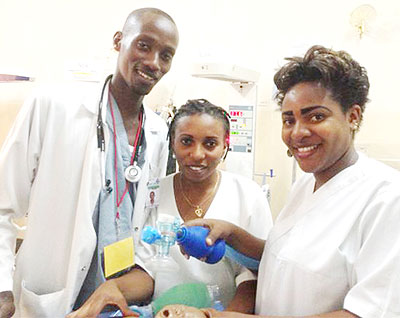Insight
Neonatal resuscitation, the golden life saver
The successful transition from intrauterine to extrauterine life is dependent upon significant physiologic changes that occur at birth. In almost all infants (90 per cent), these changes are successfully completed at delivery without requiring any special assistance.
However, about 10 per cent of infants will need some intervention, and 1 percent will require extensive resuscitative measures at birth.
Globally, about one quarter of all neonatal deaths are caused by birth asphyxia, according to the World Health Organisation. Birth asphyxia is the failure to initiate and sustain breathing at birth. Effective resuscitation at birth can prevent a large proportion of these deaths.

Dr Athanase (L) poses with nurses at Kibagabaga Hospital after training in neonatal resuscitation. Courtesy photo.
